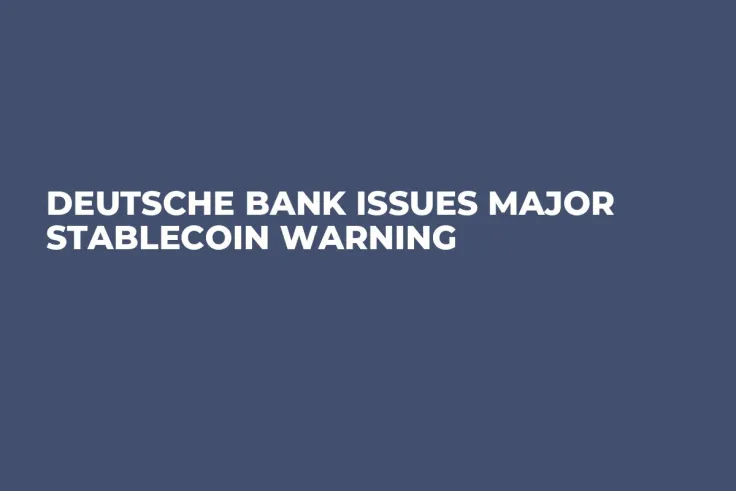
Disclaimer: The opinions expressed by our writers are their own and do not represent the views of U.Today. The financial and market information provided on U.Today is intended for informational purposes only. U.Today is not liable for any financial losses incurred while trading cryptocurrencies. Conduct your own research by contacting financial experts before making any investment decisions. We believe that all content is accurate as of the date of publication, but certain offers mentioned may no longer be available.
In a recent development, Deutsche Bank, one of the largest and most influential banks globally, has issued a significant warning regarding stablecoins.
The warning highlights potential risks associated with this class of digital assets, delving into the topic of increasing the importance of the cryptocurrency ecosystem.
Stablecoins, a type of cryptocurrency pegged to traditional fiat currencies like the U.S. dollar or euro, have gained widespread popularity in recent years. A new class of stablecoins, algorithmic stablecoins, use algorithms to maintain a stable price relative to another asset or basket of assets.
These digital assets offer the promise of stability amid the volatility of cryptocurrencies, making them attractive for various use cases, including remittances, payments and decentralized finance (DeFi) applications.
However, a recent report from Deutsche Bank has cast a shadow over this perceived haven, issuing a stark warning about stablecoins, including the widely used Tether (USDT).
The research, which examined 334 currency pegs since the year 1800, found that only 14% have survived. Applying this to the world of stablecoins, Deutsche Bank Research analysts believe that the majority of these pegged digital currencies will become unmoored.
"Some may survive, although most will likely fail," the analysts wrote on Tuesday.
Terraform Lab's algorithmic stablecoin TerraUSD and its sister token Luna collapsed two years ago, wiping away at least $40 billion in cryptocurrency.
According to Deutsche Bank researchers, the few successful pegged currencies that survived did so because they were credible, backed by reserves and functioned in carefully controlled institutions, which they say many major stablecoins lack.
Deutsche Bank's warning comes at a time when stablecoins are experiencing unprecedented growth and usage, with their total market capitalization surpassing significant milestones.
Tether, the first and largest stablecoin by market cap, disagrees with Deutsche Bank's assessment, claiming that the research lacks clarity and sufficient evidence.

 Vladislav Sopov
Vladislav Sopov Dan Burgin
Dan Burgin